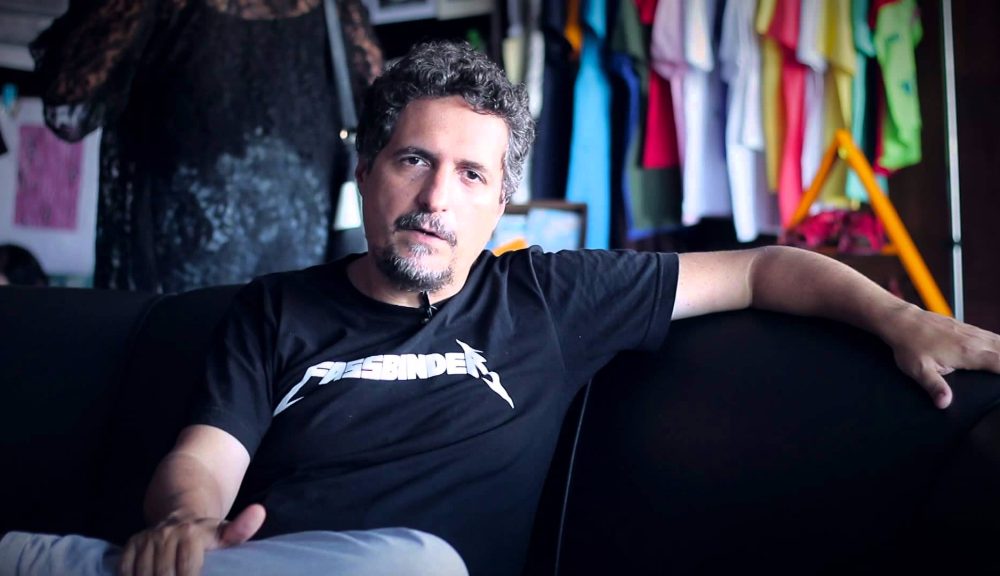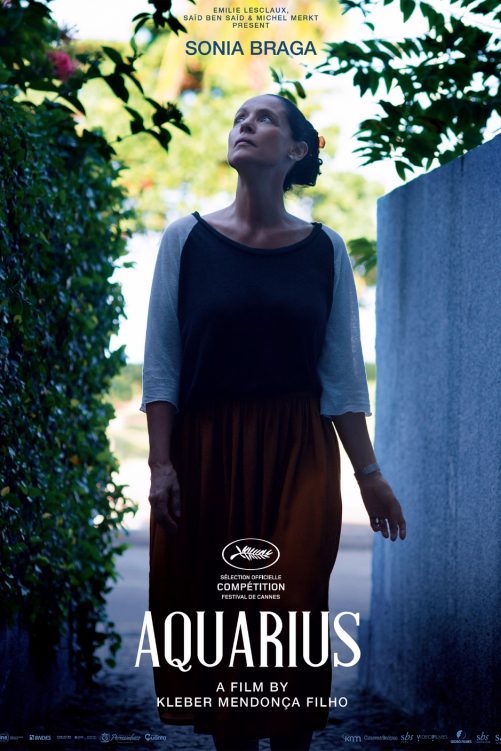Aquarius: An interview with director Kleber Mendonça Filho

With the imminent UK release of his second feature film, The Upcoming caught up with director Kleber Mendonça Filho to talk about his work. The movie is Aquarius, a story about a woman “of a certain age” fighting against the corporate tycoon who wants to take over the building she lives in, while also richly portraying her everyday life in vibrant detail. Filho made his filmmaking debut in 2012 with Neighbouring Sounds to international acclaim and is not about to curb his creative streak, as he is already working on a third feature – which we cheekily asked him about.
Hello Kleber, and thank you for this interview. In your own words, what is your most recent film about?
I think a good film or a good book is never about one thing, it has to work on different levels. When I was writing it, I thought about how to portray a woman, considering that commercial cinema has some serious issues, I think, in the way women are represented – especially, and these are not my words, “women of a certain age”. So, that was the first thing: she would never be the granny type, doing macromé all day. She would be a woman who happens to be 65, and full of issues. She’s happy, she’s not perfect, she can be arrogant, she can be irritable, she treated cancer when she was young, she had a mastectomy, she has a nephew she loves – all these things create something interesting.
Another thing is I wanted to work with archives. I love archives. Not public archives – the kind we all have. Pictures, books, letters, things we keep around the house. It doesn’t mean that you are a nostalgia freak, it just means that you have a life and you pick up things during your life. You inherit things. Sometimes a piece of furniture, like her aunt’s dresser – all these things will be very normal and mundane. There’s no one object that you can sell for thousands of dollars. These are normal objects. Then of course the apartment is part of that archive as well as Clara herself, a human being who has been alive for 65 years.
A lot of people say the film is about resistance and, yes, it is. I was also interested in somebody who has the power to say “no”. In a society that sometimes expects you to say “yes” and that becomes an issue because she is not supposed to say “no” to those construction people, because their offer is very generous.
In a way, it’s about fighting corruption.
Yes, another issue that arises from the plot is trying to look the process of corruption in the face, trying to understand how it works.
It’s also about time, of course. Cinema is fascinated with time and we’ve all seen great films about time. Sometimes it gives you real time and sometimes it compresses time in a crazy way, like the dissolve from the apartment in 1980 to the apartment in 2015 for example.
I was wondering if there were any Brazilian cultural references in Aquarius that Western audiences may not grasp?
If you make an interesting film, it should play well no matter where you screen it. We screened the film initially in Cannes to an international audience and it was very well received. However, as we got closer to Brazil, some little details were more and more understood. Once it got closer to Recife, reception was even more colourful because that is where people start to get all the very specific references to geography.
For instance, there is a very wide shot of the city when Clara is playing a song with her nephew in the car, and when I open up the shot, normally you would see two 40-storey towers, which were built ten years ago in the historic district. There are laws to avoid projects like that from being built in a historical area of the city centre, but of course through corruption and the flexible reimagining of laws, they were built anyway, so I decided to erase them from the film! Of course you would never get that over here, but at the Brazilian premiere in Recife (in this wonderful 1952 Movie Palace that still exists in downtown Recife), the reaction from the audience was dramatic. It’s like realising that some very well known ugly building in London is gone from a film.
You used to be a critic before you started writing movies. What made that morph into creating rather than reviewing, and when?
It just evolved very naturally. I worked as a film critic for 13 years and during that time I was also making my short films, which got to be quite successful as far as short films go, and then I finally got around to my first feature film, which was Neighbouring Sounds, and I realised that I could not go on writing. I had to dedicate my time to making the film.
You stuck a poster of Barry Lyndon on the wall of Clara’s apartment. Who are some of your most beloved filmmakers?
I grew up watching John Carpenter, he has had a gigantic influence on my work. His films always seemed to be “doable”, in a way. Something like Raiders of the Lost Ark is an amazing film-going experience, but it never made me want to make films because it looks so crazy and expensive. But when I saw the Carpenter films, they looked like something that I could maybe, you know, do. They looked small enough. And they were strong enough for me to feel excited about them. One of my favourite films in life is Idi Smotri by Elem Klimov.
Mostly, I really love cinema from the United States in the 70s: they made the best adult films. That’s the main thing. They were made for adults. Today, a lot of the commercial films feel like they are afraid that there is a kid in the room. So when they do show sexuality, it is kind of toned down rather than being like a conversation between adults. For me it’s always more interesting if you don’t have to worry who’s watching.
Interesting you should mention that, as I was just going to ask you about the significance of the many explicit sex scenes in this film.
It’s a little bit like what I told you about the representation of a normal woman. The representation of sex in commercial movies is always very formatted, it’s almost like market sex. I think that sex is part of life and should be addressed in a very natural and normal way, and it will certainly break a few rules if you do that. For example, in most Anglo-American cinema, sex is usually a plot device for death, disease, psychosis, pregnancy, and all the embarrassments and humour that go along with it. It’s disgusting, and I am really not into that idea of how sex is portrayed. I really like that Aquarius is not about sex but it has sexual moments taken out of life.
It’s like a portrait, just displaying raw elements from her life.
In a natural way.
Whom do you work with for the visual elements?
A lot of what you see in the film is already in the script. For me it’s important that somebody who reads one of my scripts should visualise my film. They are not two pages long of course, just short descriptions that give an idea of how I want to shoot. Of course I work with very good people, friends who make the films with me and it’s a very enjoyable experience. We had about 80 people working on this film, excluding the actors.
Are there any people you really want to work with, creatively, or are you happy working on your own?
I am getting into reading scripts that I have not written, it is a new experience for me. I send my work to some director friends for friendly advice, and vice versa, but we do not work on each other’s films.
How long does it take for you to write a script, and how do you go about it?
Aquarius went quite fast, though only if you count the first version. Of course, over two years the script gathers more details and information. You could basically see the film that you saw from the first version. In that scene I told you about, when she’s in the hammock: first it was “people playing football, she’s in the hammock”. Then it was “people having sex, people playing football, and she’s in the hammock”. And then, Oh! people should arrive and do a party upstairs, and that’s in the third version. And these are elements that come out of the actual script. I’m reading the script again and you know, maybe I could do this.
You start with the outline of the plot and put little bits in. It’s very organic and it’s more like a list of things I would find cool to see in a film. Oh, and there is also the moment when I choose which song she’s going to play. Interestingly, Fat Bottomed Girls was always there, it survived all the other versions and the edits. Some ideas are very good to begin with; some ideas just disappear.
What was one of your favourite scenes to work on in this movie?
That’s a tough question to answer. Every scene, for me, has to be interesting. It will never happen that I finish a day, ask my assistant, “What are we gonna shoot tomorrow?”, she’ll say, “that scene”, and I go “Ohhh, damn”. I’m always into every scene that I write.
If you ask me a scene that I love to see today in Aquarius, it is when she goes to the construction company and she throws all the stuff on the table. The final scene. Because there is so much energy from Sonia. She was so pissed off in that scene, she just – it’s almost like the ape man in 2001, with the bones. And I also liked the scene where there is people f**king on the beach, when the camera shows what is happening outside before panning into Clara’s apartment.
Yes, it was a bit like taking a walk through the park to get to her place. Can you tell me about your newest project?
I think it’s going to be like a Western, shot 300km from Recife, where I shot Aquarius. It takes place a few years from now, and it’s about a very special and very small community. They find that they are very talented with violence, something they did not know they were.
Thank you very much for your time.
Thank you.
Jennifer Sanin
Aquarius is released nationwide on 24th March 2017.
Watch the trailer for Aquarius here:


























Facebook
Twitter
Instagram
YouTube
RSS